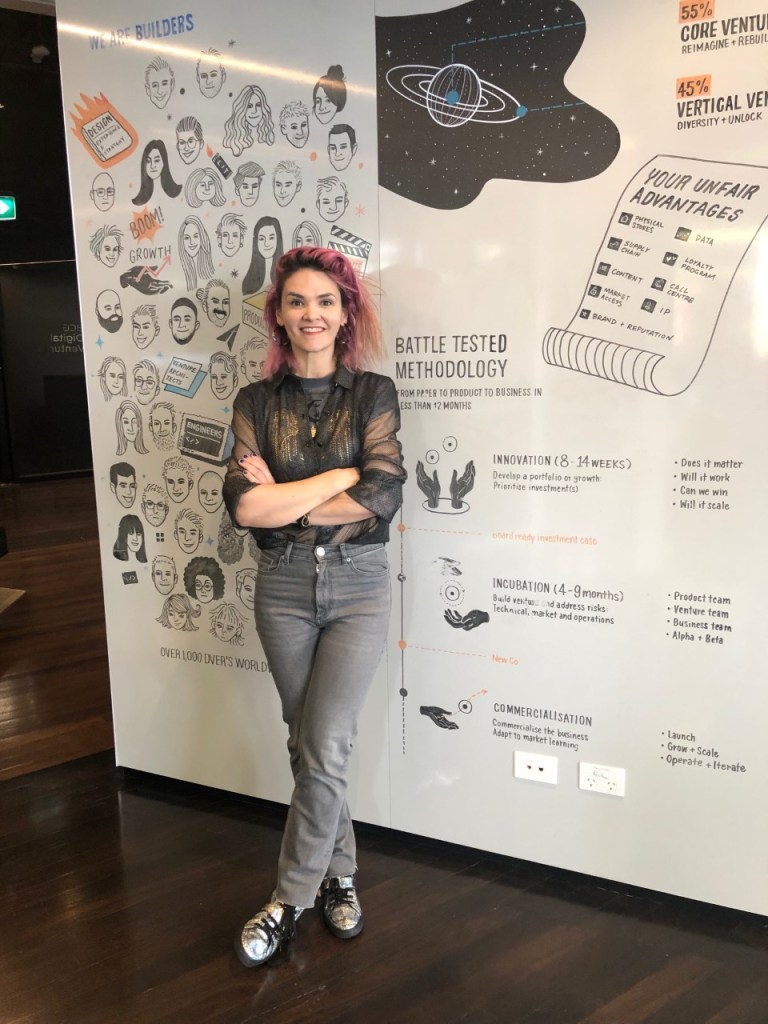Businesses are hiring entrepreneurial spirit and expertise to develop their next big thing.

BCG Digital Ventures is the business building firm and innovation hub of the Boston Consulting Group. It partners with corporations to invent, launch and scale innovative businesses that might be new, standalone companies or ones developed within the client organisation.
Kate O’Keeffe, was born in Melbourne, started a couple of businesses, worked as a consultant at a water company, and then spent 10 years in Silicon Valley setting up the CISCO CHILL innovation lab. O’Keeffe is now a key partner at Digital Ventures, working as head of design in Sydney since 2020.
In her previous job, her favourite part was creating startups from scratch, “taking an idea for a partner, trying to find a CEO, supporting it through its seed funding”. Now she gets to do that every day, having worked on about 200 corporate ventures in two years at DV.
“It’s all about how do you pivot until you find that product market fit. That’s how we approach building a startup.”
Everybody at DV has an entrepreneurial background.
“We’ve all done it. That is what is special here. We all have muscle memory when it comes to these problems and how to resolve them. We’ve seen them before and can address them quickly.
“Our team reflects the society we are building for and that builds better products. We have great diversity here that really reflects society. It brings better ideas and it continues to bring great talent to our team.”
What’s the process
There’s a tried and tested methodology that the team follows: Innovation, Incubation, Commercialisation.
The initial strategic design launches research, where the team will spend time with users in the market place to identify human frictions that need solutions.
“You need a pain killer, not a vitamin for the problem,” O’Keeffe says. “You need immediate results. We want to see how deeply can we go to solve the problem.”
Experience designers work on the app and the software and product managers develop product and work with the engineering team. Venture architects design the business case, developing how to make money, sustainably.
“Marketing starts at the beginning, with growth architects and market viability testing. We put ideas into market and see what resonates with customers or the audience. Analytics from the start give us an understanding from the data and makes such a difference to clarity. Then we see how quickly can we hack a prototype and get it into the hands of customers,” says O’Keeffe. “It’s a really structured process that we follow.”
What’s makes it different
Each venture has to have something to differentiate it in the market place, and working with a large corporation is magic because of their privileged assets, says O’Keeffe.
“Seed capital is harder to come by than it was 12 months ago. However, great startups never struggle to find great capital.
“We think about what are some of the advantages that might make the difference for a startup. Customer data, reputation, a brand, or access to market, a loyalty program, their physical footprint, supply chain advantages, licences to operate in the market – a large corporate will have some of those to give them an advantage compared with a startup starting from scratch that could take years to get to that level in the market place.
“Our team reflects the society we are building for and that builds better products.”
– Kate O’Keeffe, BCGDV partner
“When we are creating startups for large corporations, it has to stand on the shoulders of an unfair advantage that the corporate has. Otherwise it won’t maintain its momentum. The large corporate has to be aligned with the direction and the startup has to really deeply benefit from their involvement.”
O’Keeffe credits digital native entrepreneurial talent as a craft, a skill, just like accounting or marketing, and says acknowledging the people with the experience to do the job is an important leap that corporations sometimes need to overcome for the successful development of ideas.
“You would never ask your accounting department to take on some high finance investing work that they don’t have the skills for. I hear this a lot when I talk to corporates about their current innovation capability. Leadership expects current staff to move at startup speed when they don’t have that startup speed mentality, don’t have maturity with agile, and are not funded to take these risks, and there are sky-high expectations of exponential growth.”
O’Keeffe says that finally there appears to be a transition by large corporates away from expecting internal teams to be able to deliver that kind of growth.
Working together can take the guess work out of it and the speed to market can reduce the costs involved. There can be a high level of clarity from the data and the methodology, O’Keeffe says.
“Delivering growth like that requires a really different talent profile. In the workplace of the future, there is real curiosity about working with talent that wants to work with your large corporation, but not necessarily for your large corporation. That is part of where the value of corporate venturing can come from.
“If you are looking to deliver exponential growth, at speed, that works really deeply with your end users to rethink problems from scratch, then corporate venturing is a really good approach. We would humbly submit the large corporation understands its business better than we do, but what we understand better usually is digital native growth and entrepreneurship to build quickly at scale.”
